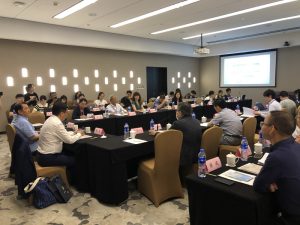JACAR Newsletter
JACAR Newsletter Number 41
September 30,2023
Outreach Activities
Participation in a Workshop Held at Nanjing University
1.Research Center for the History of the Republic of China at Nanjing University (RCHR-NJU), in conjunction with the University’s School of History, on July 12, 2023 (Wednesday) jointly sponsored a Workshop on Archives Overseas and Modern Sino-Japanese Relations. The event brought together representatives of archives in Japan, China, and the U.S., with staff from the Japan Center for Asian Historical Records (JACAR) and the Harvard-Yenching Library participating at the invitation of the RCHR-NJU. Around 30 undergraduate and graduate students from Nanjing University and Nanjing Normal University, among other institutions, were also in attendance.
2.In the opening keynote speeches, representatives from the Harvard-Yenching Library, the RCHR-NJU, and JACAR gave lectures that covered the holdings of their respective institutions as well as current conditions, policies, and the like.
In his keynote speech titled, “The Challenges for the Japan Center for Asian Historical Records,” JACAR Director-General Dr. Hatano Sumio discussed the Center’s status as forerunner in making cross-searches possible and creating text copies of records; extending the scope of the records available to the postwar period; efforts aimed at expanding the records available through the encouragement of link-sharing initiatives; the prospects for the global sharing of records taking into account being able to produce totally text-based versions of records through the use of OCR; and the successes and issues faced by JACAR.
In his keynote speech, Professor Chen Qian Ping, chair of the academic committee for the RCHR-NJU, spoke of the need for research that has an international perspective and also takes into account the use of multinational historical records in the quest to lift scholarly historical research up to even higher levels.
3.Next, as “Reports from Researchers,” eight researchers from the three archival institutions at hand—including Doshisha University Professor Murata Yujirō (a member of the JACAR Advisory Committee) and JACAR Researcher Kaneko Takasumi—made presentations regarding the history of Sino-Japanese relations in the modern and contemporary periods.
Professor Murata reported on the value as source materials of Japanese public records and personal documents such as the papers of Yuan Shikai, and on the results of research using these materials to conduct research on the history of Sino-Japanese relations during the Meiji/late-Qing periods and on the problems between North and South during the Xinhai Revolution. Researcher Kaneko showed as an example how research on Japanese policy toward the southwestern factions within the Kuomintang in the 1930s has progressed by using JACAR’s cross-search function, illustrating the possibilities for research to progress with the features offered by JACAR.
Presenters from the NJU-CHRC gave reports on the following topics.
*Historical records held in Geneva regarding the Lytton Commission
*Historical records regarding George A. and Geraldine Fitch (note: George was an American missionary born in Suzhou, China)
*Deliberations at the League of Nations following the Shanghai Incident (January 28 Incident) and Japan’s withdrawal from the League
*Historical records related to Kung Hsiang-hsi (Kong Xiangxi) in collections in the U.S. at Oberlin College, Columbia University, and Stanford University’s Hoover Institution (Note: Kung served as Minister of Finance and Director of the Executive Yuan during the years of the Kuomintang Nanjing Government).
Presenters from the Harvard-Yenching Library spoke on the following topics.
*Introductions of materials in the Harvard-Yenching Library’s collection, including collections of photographs related to the Second Sino-Japanese War from during World War II, records related to the South Manchuria Railway, and texts related to Manchuria from the Horikoshi Yoshihirō collection.
*An introduction to the Harvard-Yenching Library, accompanied by a report on the activities of George A. and Geraldine Fitch and the U.S. embargo against Japan
4.Impressions
*To date, the focus in our public outreach efforts directed overseas has focused on the history of JACAR came into being and how our services are being used. However, for this workshop, along with a general introduction in keeping with our fellow participants’ interests we gave a concrete explanation about how to use JACAR materials. This was meaningful in that we were able to have a more in-depth discussion, and also get favorable comments from participants. We will use this as a good example of how JACAR should go about public outreach in the future. In light of the foregoing, I believe the results of our participation in this workshop exceeded our initial objectives for public outreach.
*For the three participating institutions, this workshop marked the first international meeting in the three and a half years since the Covid-19 pandemic broke out. It reaffirmed the value and significance of face-to-face discussions. There were remarks from representatives from each of the institutions on the occasion of this workshop to the effect hoping to continue such exchanges in the future. In particular, we learned information about the digital records available from the Harvard-Yenching Library, and will explore the possibilities of cooperating on links in the future. Furthermore, from Nanjing University, we heard comments to the effect that users in China greatly appreciated the large amount of valuable materials that JACAR has made available over the internet.
*At JACAR, we will continue with our efforts to proactively introduce the initiatives being undertaken by JACAR as a way to spotlight for researchers and people involved in education overseas the possibilities our materials offer for Japanese studies. At the same time, we will work to revitalize anew our exchanges and public outreach activities directed toward those places around the East Asia region where Covid-19 remains rife, institutions overseas with whom we have close ties, and our users generally.
Japan Center for Asian Historical Records




